 Petzlover
Petzlover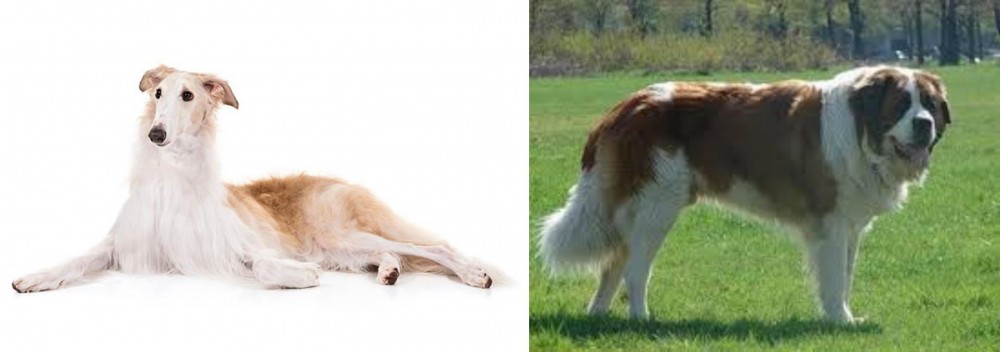 Borzoi is originated from Bosnia and Herzegovina but Moscow Watchdog is originated from Russia. Borzoi may grow 16 cm / 7 inches higher than Moscow Watchdog. Borzoi may weigh 21 kg / 46 pounds lesser than Moscow Watchdog. Both Borzoi and Moscow Watchdog has almost same life span. Both Borzoi and Moscow Watchdog has almost same litter size. Both Borzoi and Moscow Watchdog requires Moderate Maintenance.
Borzoi is originated from Bosnia and Herzegovina but Moscow Watchdog is originated from Russia. Borzoi may grow 16 cm / 7 inches higher than Moscow Watchdog. Borzoi may weigh 21 kg / 46 pounds lesser than Moscow Watchdog. Both Borzoi and Moscow Watchdog has almost same life span. Both Borzoi and Moscow Watchdog has almost same litter size. Both Borzoi and Moscow Watchdog requires Moderate Maintenance.
 Developed in Russia and also known as the Russian Wolfhound, the Borzoi was used to hunt wolf in the country. By 1873 there were only a few Borzoi which remained, and the Imperial Association was created to protect this graceful, elegant dog. They were often presented to European nobility as gifts, and thanks to a few dedicated breeders, the breed was saved from extinction and exported to other parts of the world. He was imported to the UK in the late 19th century, and it was Princess Alexandra who did a lot to increase the dog’s popularity in Britain.
Developed in Russia and also known as the Russian Wolfhound, the Borzoi was used to hunt wolf in the country. By 1873 there were only a few Borzoi which remained, and the Imperial Association was created to protect this graceful, elegant dog. They were often presented to European nobility as gifts, and thanks to a few dedicated breeders, the breed was saved from extinction and exported to other parts of the world. He was imported to the UK in the late 19th century, and it was Princess Alexandra who did a lot to increase the dog’s popularity in Britain.
The tall, slender, elegant dog was recognized by the AKC in 1891. The Borzoi Club of America, which started off being known as the Russian Wolfhound Club was formed but in 1936 the name was changed to Borzoi. The Russian world ‘Borzoi’ is a term used to encompass all Sight Hounds. Today he is no longer used for hunting but is a gentle companion.
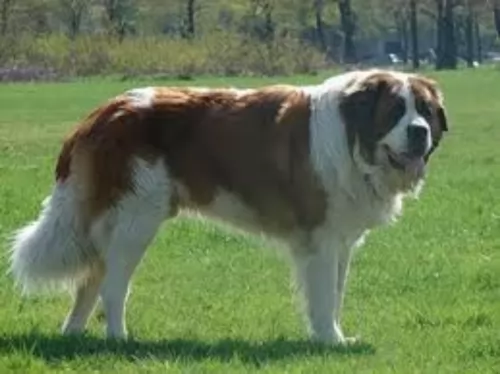 The Moscow Watchdog is a cross between the Caucasian Oytcharka, the St. Bernard and other Russian hound dogs. This large breed dog was developed in the Soviet Union for the purpose of being guard dogs. It had the awareness and assertiveness of the Oytcharka and the size, intelligence and attractiveness of the St. Bernard. The breed is common in Russia today but hardly seen anywhere else even though they were exported to the United States and Europe. The breed had the first U.S. born litter in 2015 and it is not AKC recognized.
The Moscow Watchdog is a cross between the Caucasian Oytcharka, the St. Bernard and other Russian hound dogs. This large breed dog was developed in the Soviet Union for the purpose of being guard dogs. It had the awareness and assertiveness of the Oytcharka and the size, intelligence and attractiveness of the St. Bernard. The breed is common in Russia today but hardly seen anywhere else even though they were exported to the United States and Europe. The breed had the first U.S. born litter in 2015 and it is not AKC recognized.
Following the second world war crime was on the rise in the Soviet Union and a new breed of dog was needed to counter this trend. The dog had to be adaptable to very cold temperatures, snowy weather and have a guard dog personality and ability. The breed was called on to guard such locations as railroads, government offices, warehouses, infrastructure and labor camps.
The project to develop this breed was led by General Medvedev beginning in 1946 at the Central School of Military Kynology – which was a department of the Soviet Ministry of Defense. It took many years to develop the Moscow Watchdog which then became a very successful breed.
It took until 1985 for the breed to be “officially” recognized in the Soviet Union and until 1992 to be recognized by the Federation of Dog Breeders in Russia and until 1997 for the standard to be approved by the Russian Kennel Club. They are still working with the FCI to gain international recognition for the breed. At the moment they are considered a part of the Molosser group and shown in the “Special Show” in Russia.
Committed breeders brought the Moscow Watchdog to Hungary in 1986 in order to make the breed more popular. In addition to this there were many breeders from previous Soviet States that wanted to preserve the breed as well. There were about 500 Moscow Watchdogs in Hungary around then. Currently there are about 27 Moscow Watchdogs in the United States. The breed is known to be a gentle giant and very much a family dog these days.
 The Borzoi’s silky coat is longer with the male dogs than with the females. The height of these tall graceful dogs is 68 to 74cm. You’ll find that the Borzoi’s back is quite bony and it rises in a curve. He has a tall, lean body and a long, narrow head to match with small, thin ears which rest backwards towards the neck.The silky coat comes in a number of colors - tan, white, black or a mix such as sandy and white or tan and white. The coat is often wavy or slightly curly. The soft undercoat becomes thick in the Winter and he sheds this hair in hotter weather. You’ll find the coat frills on the neck and there is feathering on the hindquarters and with the long tail.
The Borzoi’s silky coat is longer with the male dogs than with the females. The height of these tall graceful dogs is 68 to 74cm. You’ll find that the Borzoi’s back is quite bony and it rises in a curve. He has a tall, lean body and a long, narrow head to match with small, thin ears which rest backwards towards the neck.The silky coat comes in a number of colors - tan, white, black or a mix such as sandy and white or tan and white. The coat is often wavy or slightly curly. The soft undercoat becomes thick in the Winter and he sheds this hair in hotter weather. You’ll find the coat frills on the neck and there is feathering on the hindquarters and with the long tail.
The Borzoi is a gentle, sweet dog, to such an extent that they don’t make good watch-dogs. He is good with other pets and children, although he isn’t the kind of dog to indulge in games with children. He doesn’t bark much and he is also not a high-energy dog, being fairly happy to make himself at home indoors. This is a faithful, loyal and courageous dog.
His temperament is quiet, sensitive, intelligent and somewhat aloof. Even though he has these quiet characteristics, he will still need training and socialization as this just rounds your dog off, making him a pleasure to have around.
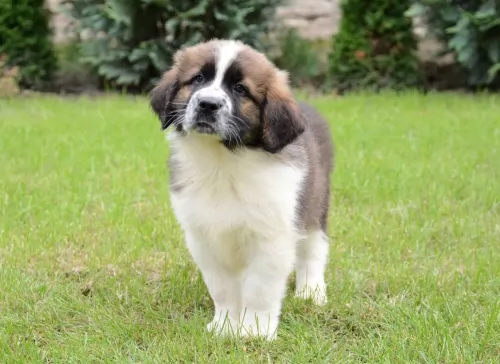 The Moscow Watchdog is related to the mountain dogs and is a very large breed. They are sturdy, muscular and powerful. They have big heads and a thick double coat that sheds profusely four times a year. They have a long tail, an arched chest and an air of confidence.
The Moscow Watchdog is related to the mountain dogs and is a very large breed. They are sturdy, muscular and powerful. They have big heads and a thick double coat that sheds profusely four times a year. They have a long tail, an arched chest and an air of confidence.
He is in the Mastiff family and is smart and trainable. He is not clumsy but has big bones. He is surprisingly agile and active for a dog his size. Unlike the St. Bernard he is not a couch potato. He is also differentiated from the St. Bernard because he does not drool.
These dogs are large but they’ve got a gentle temperament and are good with kids, being playful and energetic with them.
Even though he is a docile dog, you want him trained and socialized, and then he gets along well with other pets too. His sheer size makes it that it is best to supervise him when he’s around small children. He is also a protective dog breed, willing to bond closely to, and protect his human family.
 If you’re looking for a quiet, amicable, elegant breed, you’ll love the big Russian Borzoi, known for his gentleness, sweetness and gracefulness. He is a friendly dog with his human family, although not too keen on children with their boisterous games. It is his gentleness however, that has endeared him to so many dog lovers.
If you’re looking for a quiet, amicable, elegant breed, you’ll love the big Russian Borzoi, known for his gentleness, sweetness and gracefulness. He is a friendly dog with his human family, although not too keen on children with their boisterous games. It is his gentleness however, that has endeared him to so many dog lovers.
Even though he isn’t one of the most active dogs, he will still need exercise and a walk as he is a big dog used to wide, open spaces. He’ll need the opportunity every now and then to simply run.
He makes a wonderful pet for new- or seasoned pet owners, and if you’re looking for a quiet, devoted companion, why not welcome an elegant, graceful Borzoi into your home?
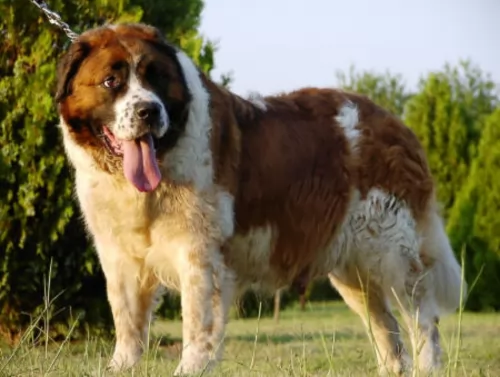 This is a large dog who likes to be involved and busy, even though he is so big. He isn’t suited to city life and being confined to a tiny garden as he needs space.
This is a large dog who likes to be involved and busy, even though he is so big. He isn’t suited to city life and being confined to a tiny garden as he needs space.
They’re independent dogs too and you can leave them alone during the day. He is social, so while you can leave them during the day while you’re at work, he’ll want your attention when you get back. They're such loving, loyal family pets that you owe it to him to make this gentle giant of a dog as happy as can be.
 The Borzoi is a healthy dog, and you’re not likely to be taking him to the veterinarian often but you do need to know about illnesses which are more prevalent in these large breed dogs.
The Borzoi is a healthy dog, and you’re not likely to be taking him to the veterinarian often but you do need to know about illnesses which are more prevalent in these large breed dogs.
This is a common bone tumor found in dogs and it is more commonly found in large breeds. It can spread quickly to other parts of the body, and although there are treatments, the long term prognosis isn’t good. Your dog will have pain and swelling.
Lymphosarcoma is a common cancer diagnosed in dogs. It is a cancer of lymphocytes and the average dog gets it from 6 years on. Some dogs may not necessarily feel sick, while others are tired, they don’t eat, they lose weight and may have diarrhea.
This is a disease that can be deadly for your dog. Known as gastric dilatation, the stomach twists and fills with gas, putting pressure on the diaphragm, and creating breathing problems. Bloat is more common in large breeds and its up to you as a responsible dog owner to watch out for a swollen stomach with drooling and attempts to vomit.
Remember that some health problems are inherited, but there are other health problems that can be prevented by the way you treat- and raise your dog.
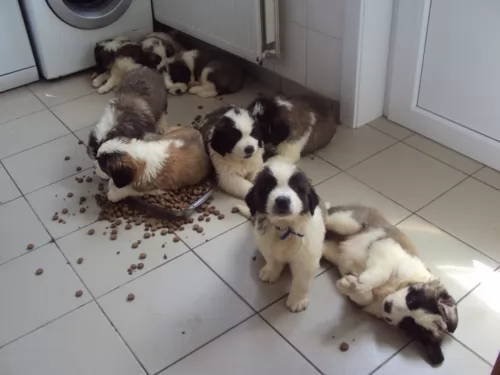 Moscow Watchdog is looked upon as a fairly healthy dog breed but there are some risks such as hip dysplasia as well as some other large breed problems.
Moscow Watchdog is looked upon as a fairly healthy dog breed but there are some risks such as hip dysplasia as well as some other large breed problems.
With big dogs like this, hip dysplasia is a threat. Its an hereditary condition where the parent dogs pass down the problematic genes. Hip dysplasia results in inflammation and pain for your pet, and where once he loved to play, he is reluctant to and battles to get up after lying down.
 Long coated dogs shed, and the Borzoi female sheds after her season and the males shed annually. Once the female is spayed, she sheds like the males. You will need to be brushing your Borzoi every day to rid the dogs of this loose hair.
Long coated dogs shed, and the Borzoi female sheds after her season and the males shed annually. Once the female is spayed, she sheds like the males. You will need to be brushing your Borzoi every day to rid the dogs of this loose hair.
Borzoi teeth collect tartar, more so than with other breeds, so their teeth will need to be brushed at least 3 times a week with special dog toothbrushes and toothpaste to prevent gum and tooth problems.
Good quality food is the foundation for good health with your pet. Home-made food is always good for your dog and should include meat, rice and vegetables. Apart from top quality commercially manufactured food for large breed dogs and recommended by your vet, make sure to include some raw meat into your Borzoi’s diet too. This is imperative to stave off ill health and skin problems. Make sure he has a constant supply of fresh, cool water available to him.
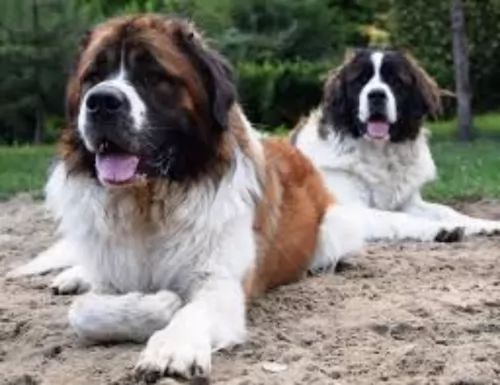 The Moscow Watchdog is a giant sized dog and will require a lot of regular exercise, and apart from a fairly brisk daily walk, will also need games and a run in the park.
The Moscow Watchdog is a giant sized dog and will require a lot of regular exercise, and apart from a fairly brisk daily walk, will also need games and a run in the park.
As a large dog requiring a regular dose of physical exercise as well as mental stimulation, he is better suited to life in the country or at least where there is a large garden.
The Moscow Watchdog has a medium length coat, and as a moderate shedder, you will need to simply brush his coat twice a week to remove loose hair. There is no professional grooming required for these dogs.
Homemade food is always a treat for a dog, but if you’re feeding your Moscow Watchdog commercially manufactured food because of the sheer convenience it provides, make sure the packaging says 'large- or giant dog breed' food. This way you know your pet is getting the right amount of minerals and vitamins for his size.
Always buy the best quality food to avoid giving your pet an overdose of colorants and preservatives. Try and give your pet some home-made food such as boiled chicken, some brown rice or pasta and some cooked vegetables such as sweet potatoes, carrots and spinach. These can be added to his kibble every now and again.
A simple diet like this agrees with your pet and he will be healthy and happy with his lot.